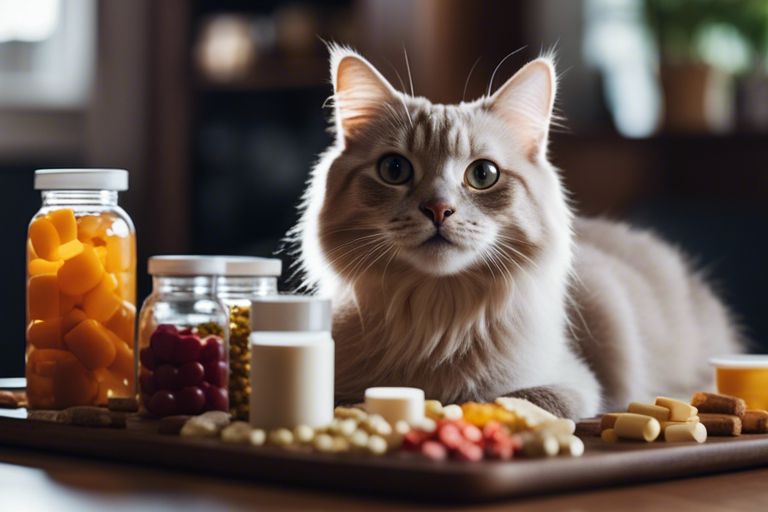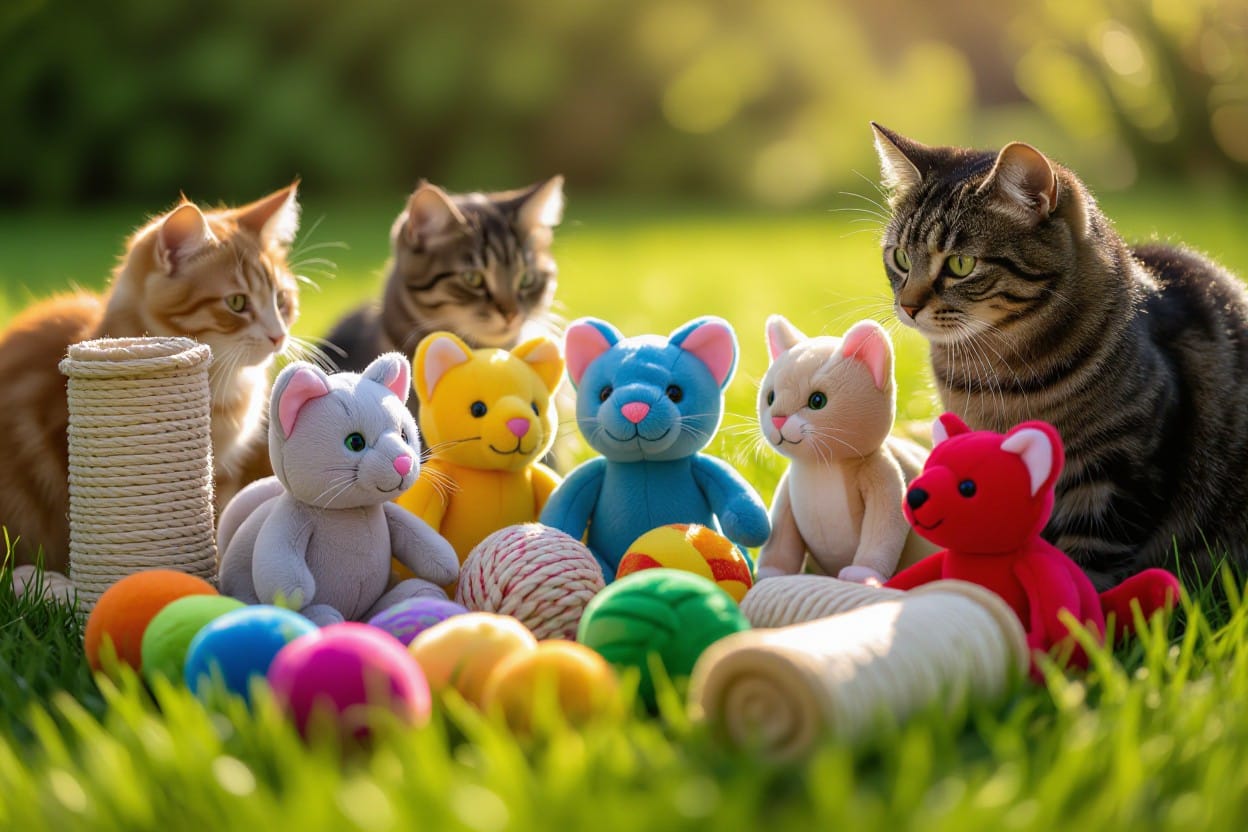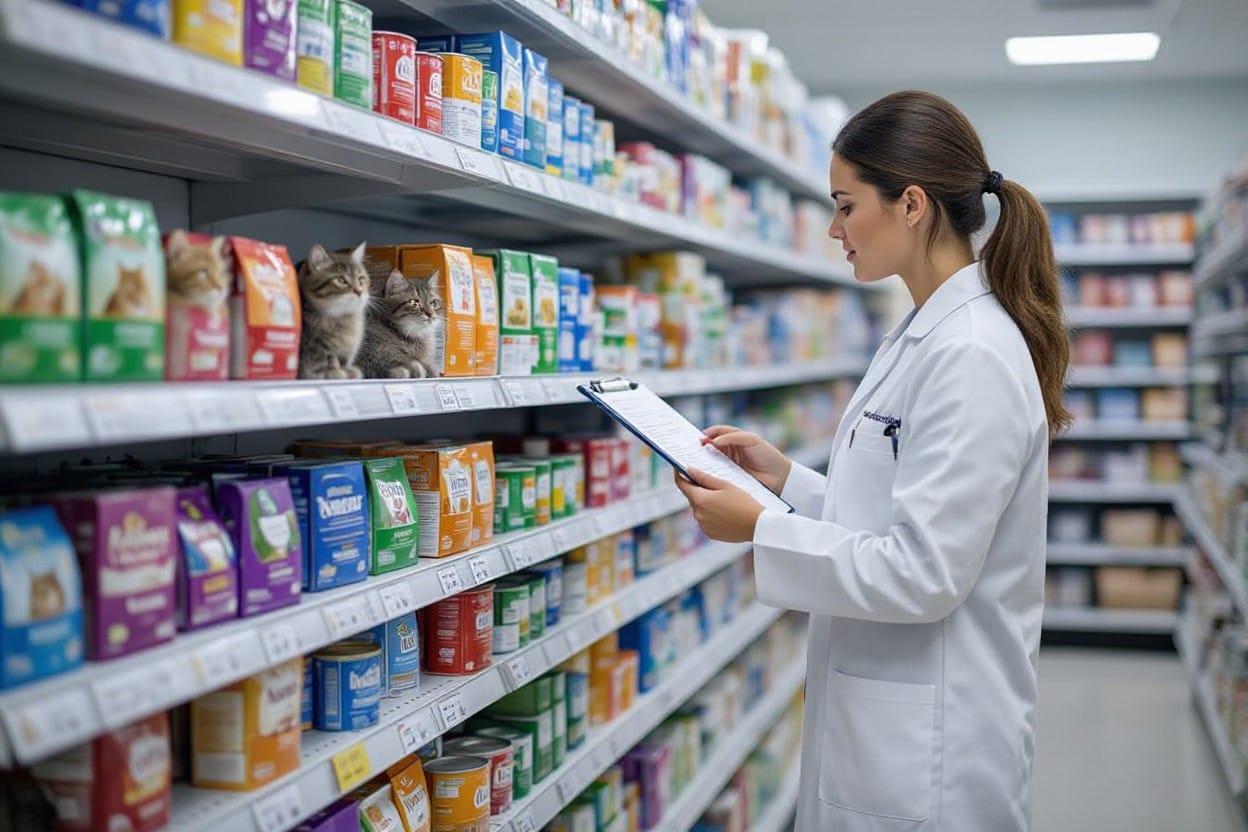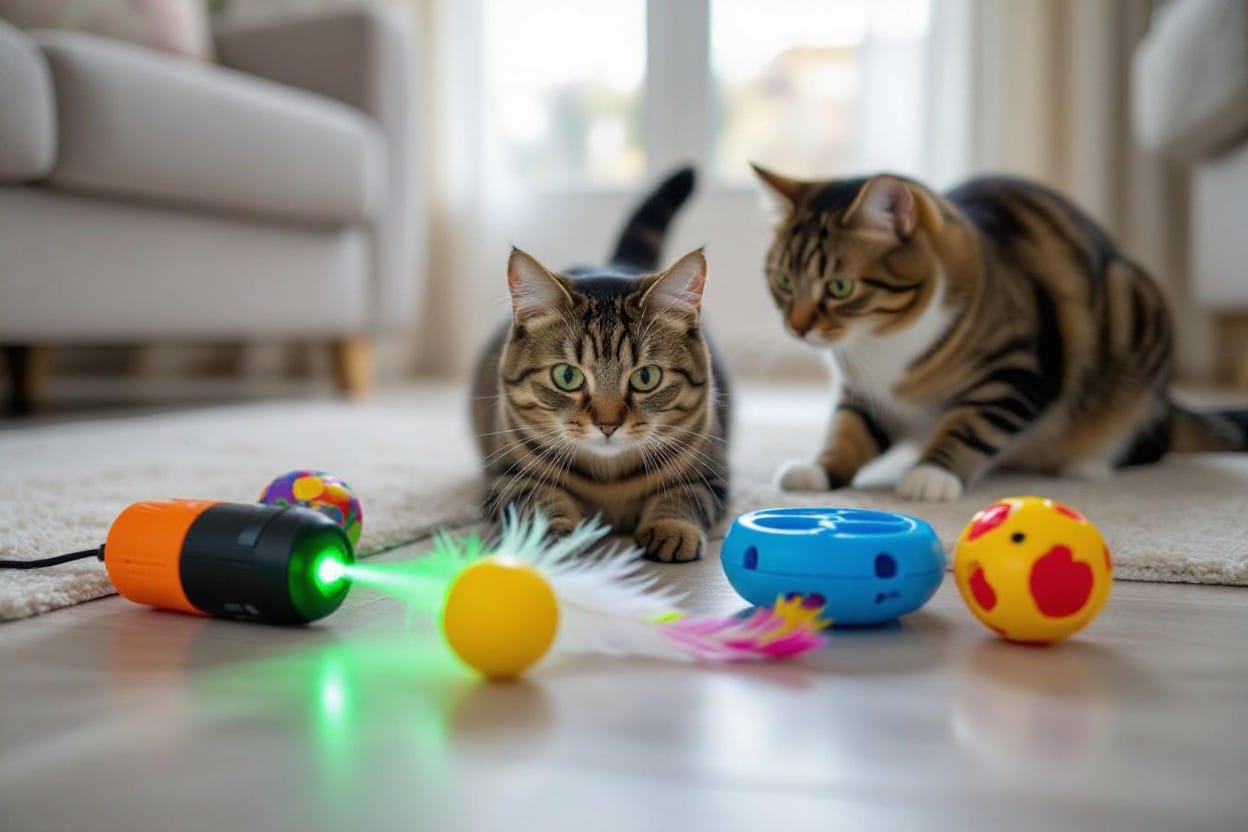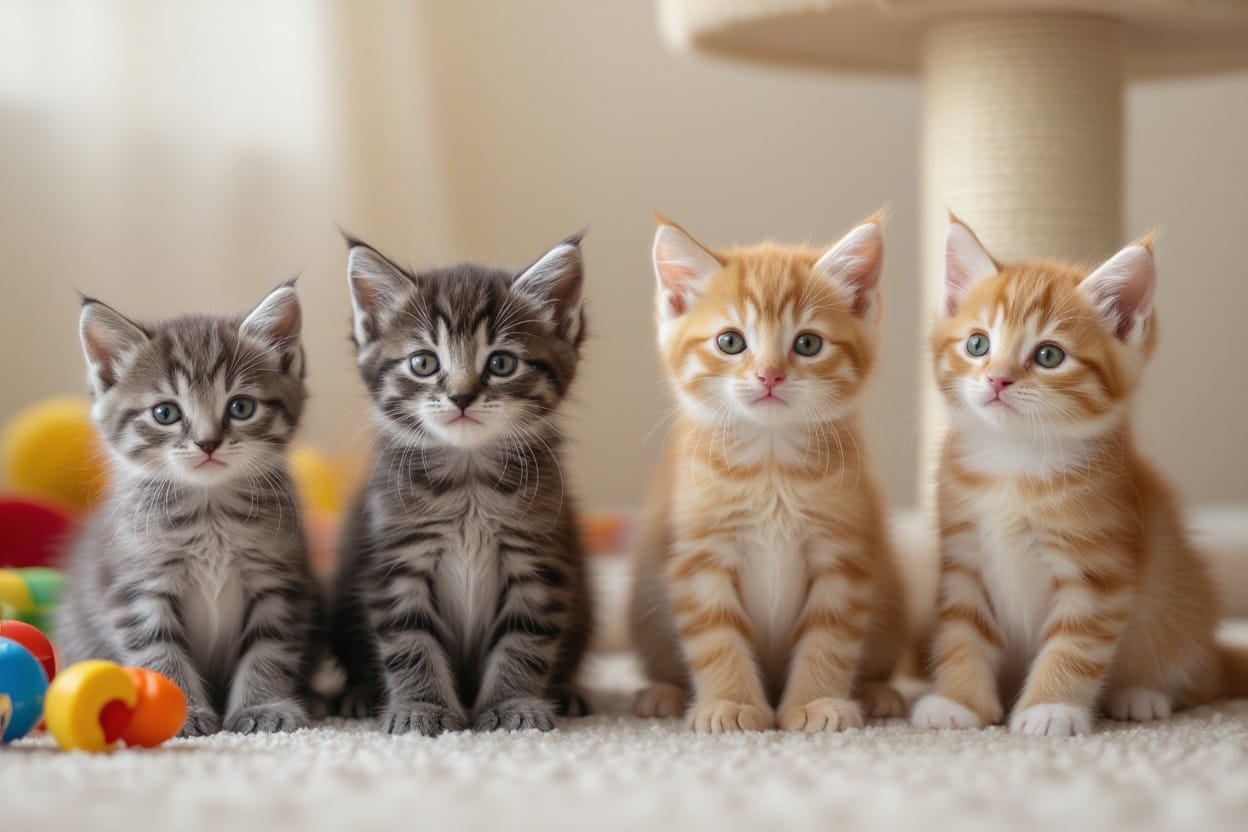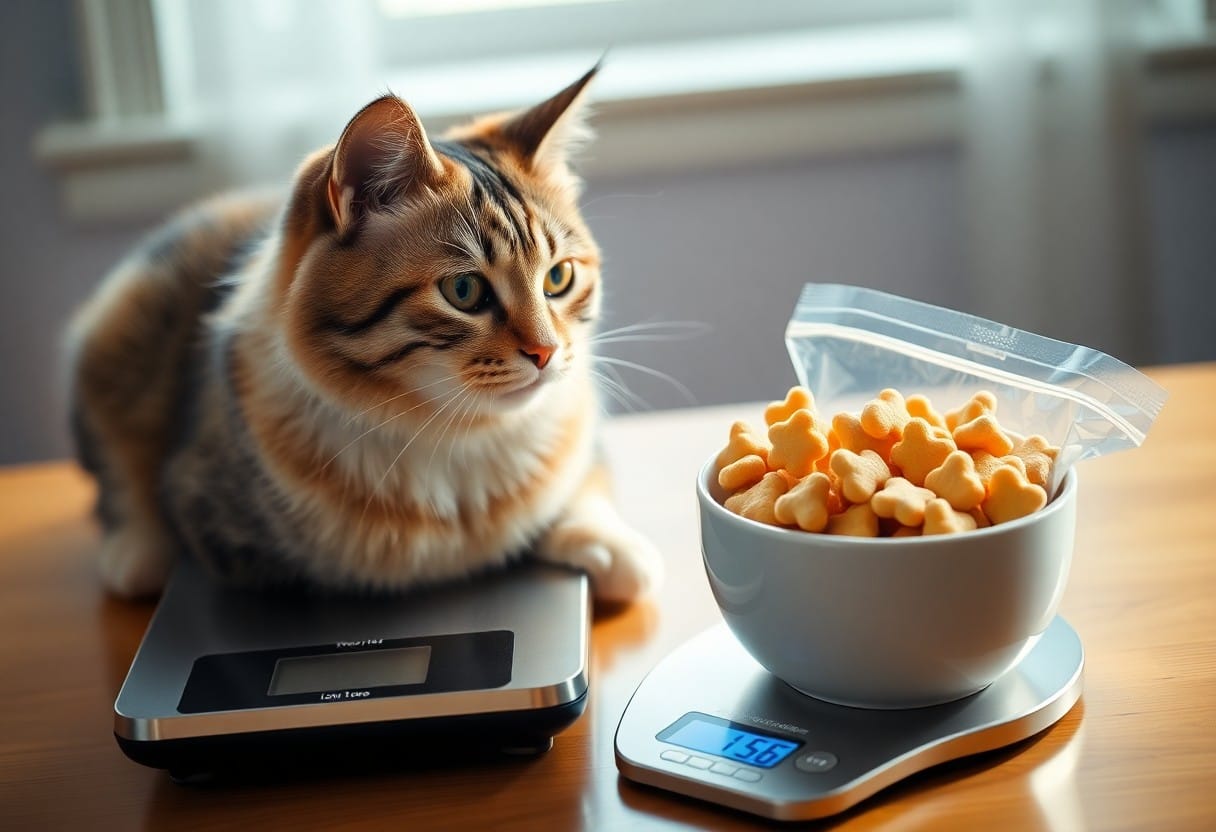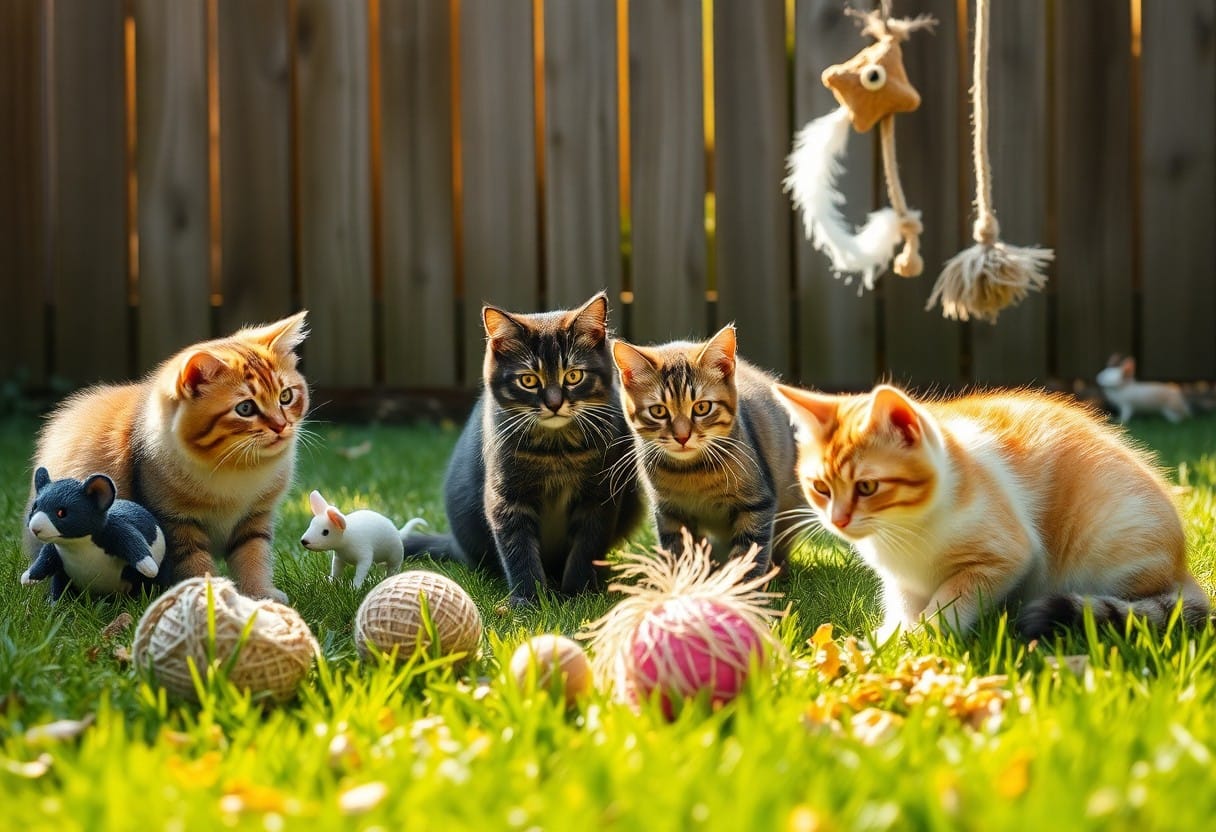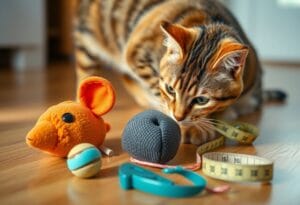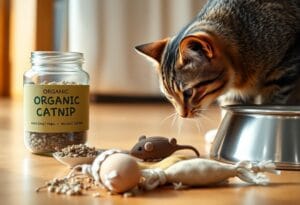It’s crucial to ensure your feline friend is getting the vital vitamins and supplements they need for optimal health and well-being. Just like humans, cats can benefit from certain vitamins and supplements to support their overall health. In this informative post, we will examine into the key vitamins and supplements that are vital for keeping your cat healthy and thriving.
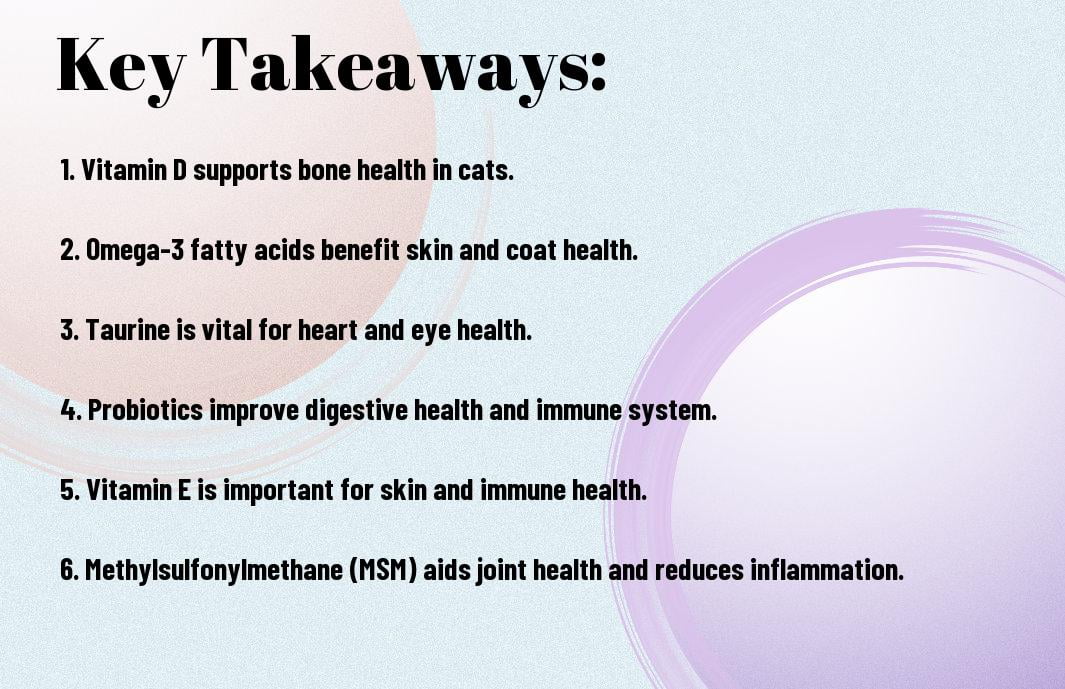
Understanding Feline Nutritional Needs
Key Nutrients for Cats
Feline nutritional needs are specific and require a careful balance of important nutrients to maintain optimal health. Cats are obligate carnivores, meaning their diet should consist primarily of animal-based protein. Key nutrients for cats include protein, taurine, vitamins (such as A, B, D, and E), minerals (like calcium, phosphorus, and magnesium), and fatty acids.
The Role of a Balanced Diet
Balanced nutrition is important for cats to thrive and prevent nutritional deficiencies. A balanced diet ensures that cats receive the right amount of protein, fats, carbohydrates, vitamins, and minerals to support their overall health and well-being. It is important to provide a diet that meets their specific needs and dietary requirements, as deficiencies in important nutrients can lead to various health issues.
Cats, like all animals, require a mix of nutrients to stay healthy and active. A balanced diet tailored to their carnivorous nature is crucial for their growth, energy levels, and disease prevention.
Essential Vitamins for Cats
Now, let’s research into the necessary vitamins that are crucial for your cat’s overall health and well-being.
Vitamin A and Its Importance for Vision and Growth
Vision is necessary for your cat’s quality of life, and Vitamin A plays a key role in maintaining good eyesight. It also supports growth and development in kittens, making it a vital nutrient for cats of all ages.
Vitamin D for Bone Health and Metabolism Regulation
To ensure strong bones and proper regulation of metabolism, Vitamin D is necessary for cats. This vitamin helps in the absorption of calcium and phosphorus, crucial minerals for bone health.
Plus, Vitamin D plays a role in supporting muscle function, nerve signaling, and overall immune system health in felines.
Vitamin E as an Antioxidant
For optimal antioxidant support, Vitamin E is crucial for cats. It helps in fighting off free radicals that can cause cell damage and lead to various health issues.
Growth, muscle function, and healthy skin and coat are also supported by Vitamin E, making it a vital nutrient for your cat’s well-being.
B-Complex Vitamins for Energy and Overall Health
The B-complex vitamins, including B1, B2, B3, B5, B6, B7, B9, and B12, play a crucial role in providing energy and maintaining overall health in cats. These vitamins are important for the metabolism of fats, proteins, and carbohydrates, and they also support the functions of the nervous system.
The B-complex vitamins are necessary for maintaining healthy skin, coat, eyes, and liver function in cats, ensuring their well-being and vitality.
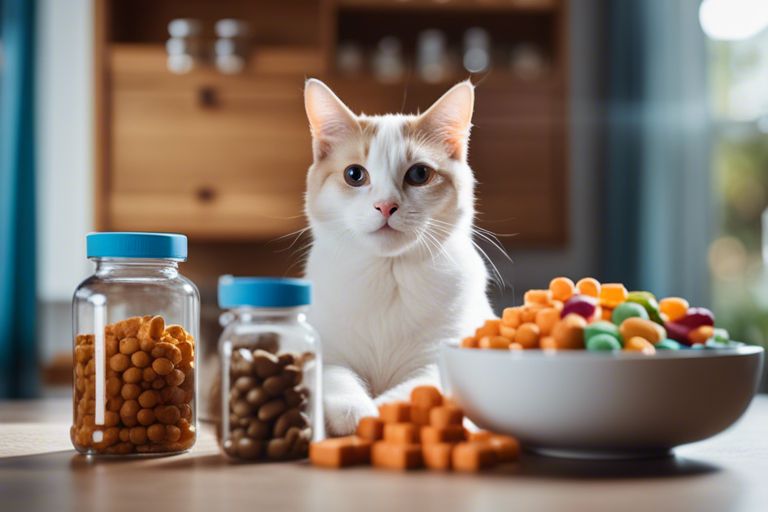
Vital Supplements for Feline Wellness
Omega-3 Fatty Acids for Skin and Coat Health
Coat health is a crucial indicator of your cat’s overall well-being. Omega-3 fatty acids play a significant role in maintaining a shiny coat and healthy skin for your feline friend. These necessary fats also possess anti-inflammatory properties that help alleviate skin conditions and promote a lustrous coat.
Probiotics for Digestive Health
On the inside, digestive health is key to your cat’s overall vitality. Probiotics are beneficial bacteria that promote a healthy gut flora, aiding in digestion and nutrient absorption. They can also help prevent gastrointestinal issues and boost your cat’s immune system.
Health-conscious pet parents should consider incorporating probiotics into their cat’s daily routine to support their digestive system and overall well-being.
Taurine for Heart and Eye Health
Omega 3 acids are important. Taurine is an necessary amino acid that is crucial for maintaining your cat’s heart health and vision. Cats cannot produce taurine on their own, so it must be provided through their diet or supplements. Taurine deficiency can lead to serious heart and eye problems, making it a vital supplement for feline wellness.
Glucosamine for Joint Support
Skin, Mobility is another important aspect of your cat’s health. Glucosamine is a supplement that supports joint health and helps prevent arthritis and mobility issues in cats, especially as they age. For instance, glucosamine can help alleviate joint pain and stiffness, allowing your cat to move around comfortably and stay active.
Age-Specific Supplements
Once again, when it comes to ensuring your feline companion’s health and well-being, age-specific supplements play a key role. From kittens to senior cats, there are different vitamins and supplements that can help support their unique needs at each life stage.
Supplements for Kittens and Growing Cats
One of the most important supplements for kittens and growing cats is a high-quality kitten formula that provides vital nutrients such as DHA for brain development and taurine for eye health. These supplements can help support your young cat’s overall growth and development during this crucial stage of life.
Specialized Supplements for Senior Cats
To ensure that your senior cat enjoys their golden years to the fullest, specialized supplements tailored to their age-related needs can be beneficial. These supplements may include joint support supplements to help with mobility, as well as antioxidants to support their immune system and overall health.
Cats, like humans, may require additional support as they age, and these specialized supplements can help address specific issues that may arise in elderly felines. Consult with your veterinarian to determine the best supplements for your senior cat based on their individual health needs and age-related concerns.
Risks and Considerations
The Dangers of Over-Supplementation
Not all vitamins and supplements are safe when given in excess to cats. Over-supplementation can lead to vitamin toxicity, causing serious health issues. It is important to follow recommended dosages and consult your veterinarian before adding any new supplements to your cat’s diet.
Interaction With Medications and Medical Conditions
With the growing trend of using supplements for pets, it is crucial to be aware of the potential interactions with medications and underlying medical conditions. Some supplements can interfere with the effectiveness of certain medications or exacerbate existing health problems.
Dangers may arise when supplements are combined with medications such as blood thinners or drugs for hypertension. Always inform your veterinarian about any supplements your cat is taking to avoid any harmful interactions.
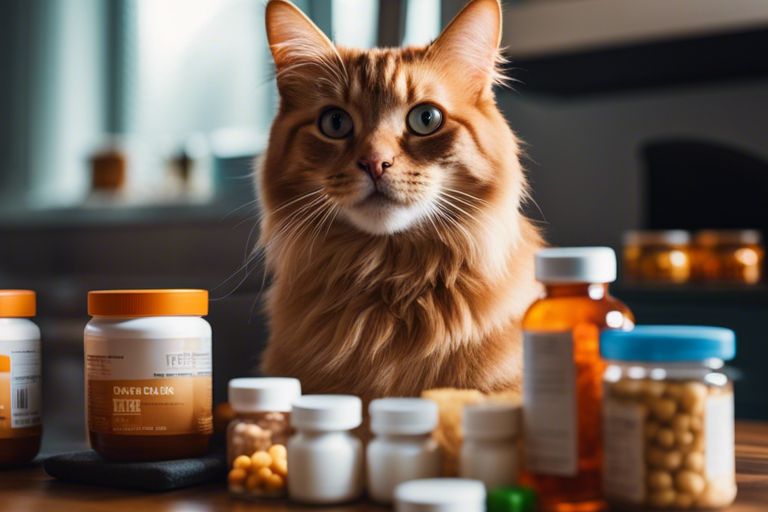
Choosing the Right Vitamins and Supplements
Despite the abundance of vitamins and supplements available for cats, choosing the right ones can be a daunting task. It is necessary to ensure that the products you select are safe, effective, and meet your cat’s specific needs.
Reading Labels and Understanding Ingredients
The key to selecting the right vitamins and supplements for your cat is to carefully read and understand the labels. Look for products that have high-quality ingredients and are free from potentially harmful additives or fillers. Ensure that the supplements meet the recommended daily allowances set for cats by authorities such as the Association of American Feed Control Officials (AAFCO).
Consulting with Veterinarians for Tailored Recommendations
Recommendations from veterinarians are invaluable when it comes to choosing the right vitamins and supplements for your cat. Veterinarians can provide tailored advice based on your cat’s specific health needs, age, breed, and existing medical conditions. They can recommend the most suitable products, dosages, and administration methods to ensure optimal health for your feline companion.
It is always advisable to consult with your veterinarian before introducing any new vitamins or supplements to your cat’s diet. They can offer personalized recommendations and monitor your cat’s progress to ensure the supplements are having the desired effects without any adverse reactions.
Administering Vitamins and Supplements to Cats
Techniques for Introducing Supplements into a Cat’s Diet
The key to successfully administering vitamins and supplements to your cat is to find a method that works best for both you and your feline friend. Unlike dogs, cats can be more finicky and resistant to changes in their diet, making it challenging to add supplements directly to their food. One technique you can try is mixing the supplement into a small portion of your cat’s favorite wet food or treat. This can help mask the taste and smell of the supplement, making it more appealing to your cat.
Monitoring Your Cat’s Response to Supplements
Monitoring your cat’s response to supplements is crucial to ensuring their health and well-being. Keep a close eye on your cat for any changes in behavior, appetite, or energy levels after introducing a new supplement. If you notice any negative reactions such as vomiting, diarrhea, or lethargy, discontinue the supplement immediately and consult your veterinarian. It’s also a good idea to keep track of your cat’s overall health and any improvements you may see with the addition of supplements.
It’s important to remember that every cat is different, and what works for one may not work for another. Cats may take some time to adjust to new supplements, so be patient and consistent in your approach. If you have any concerns about administering vitamins and supplements to your cat, don’t hesitate to seek advice from your vet.
Conclusion
The health and well-being of our feline friends are of utmost importance, and providing them with vital vitamins and supplements can help ensure that they live long and healthy lives. From vitamin A for vision to omega-3 fatty acids for a healthy coat, these nutrients play a crucial role in maintaining optimal health in cats.
By understanding the specific needs of our cats and consulting with a veterinarian, we can tailor their diet to include the necessary vitamins and supplements. Incorporating these vital nutrients into their daily routine will not only support their overall health but also prevent potential deficiencies that could lead to serious health issues down the road. Investing in your cat’s health by providing them with the right vitamins and supplements is a proactive step towards ensuring a happy and thriving feline companion.
FAQ
Q: Why are crucial vitamins and supplements important for cat health?
A: Essential vitamins and supplements play a crucial role in maintaining your cat’s overall health and well-being. They help support their immune system, digestion, coat health, and overall vitality.
Q: What are some crucial vitamins for cat health?
A: Some crucial vitamins for cat health include Vitamin A for vision and immune function, Vitamin D for calcium absorption, Vitamin E for skin and coat health, and Vitamin B complex for energy metabolism.
Q: Are supplements necessary for my cat if they are already on a balanced diet?
A: While a balanced diet is important, supplements can still be beneficial for filling any nutritional gaps or addressing specific health concerns. Always consult with your veterinarian before adding any supplements to your cat’s diet.
Q: How do I choose the right vitamins and supplements for my cat?
A: It is crucial to consult with your veterinarian to determine which vitamins and supplements are suitable for your cat’s specific needs. Factors such as age, health status, and diet should be taken into consideration when selecting the right supplements.
Q: Can giving my cat too many vitamins and supplements be harmful?
A: Yes, giving your cat excessive amounts of vitamins and supplements can be harmful and even toxic. Always follow the recommended dosage provided by your veterinarian or the supplement manufacturer to ensure the health and safety of your cat.
